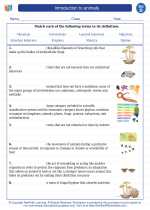Ancient Civilizations
Ancient civilizations refer to the early societies and cultures that developed complex systems of governance, education, agriculture, and trade. These civilizations laid the foundation for many of the modern systems and technologies we have today.
Key Ancient Civilizations
- Egyptian Civilization
- Mesopotamian Civilization
- Indus Valley Civilization
- Chinese Civilization
- Greek Civilization
- Roman Civilization
Study Guide
Here are some key points to consider when studying ancient civilizations:
1. Geography and Environment
Understand how geographical features and climate influenced the development of each civilization. For example, the Nile River was crucial to the success of the Egyptian civilization, providing fertile land for agriculture.
2. Social Structure and Government
Explore the social hierarchy, political systems, and laws of each civilization. Compare and contrast the different forms of governance, such as monarchy, oligarchy, and democracy.
3. Religion and Beliefs
Investigate the religious practices, deities, and rituals of each civilization. Understand the role of religion in shaping cultural norms and societal values.
4. Achievements and Contributions
Learn about the advancements in architecture, art, literature, mathematics, science, and technology made by each civilization. Consider the lasting impact of these achievements on modern society.
5. Trade and Interaction
Examine the trade routes, cultural exchanges, and diplomatic relations between ancient civilizations. Understand how these interactions contributed to the spread of ideas and innovations.
By studying these aspects of ancient civilizations, we gain valuable insights into the human experience and the development of complex societies throughout history.
[Ancient Civilizations] Related Worksheets and Study Guides:
.◂Science Worksheets and Study Guides Fourth Grade. Introduction to animals

 Worksheet/Answer key
Worksheet/Answer key
 Worksheet/Answer key
Worksheet/Answer key
 Worksheet/Answer key
Worksheet/Answer key
 Vocabulary/Answer key
Vocabulary/Answer key
 Vocabulary/Answer key
Vocabulary/Answer key
 Vocabulary/Answer key
Vocabulary/Answer key
 Vocabulary/Answer key
Vocabulary/Answer key
